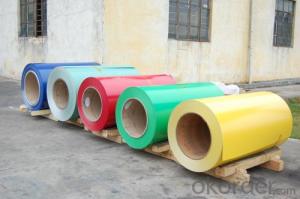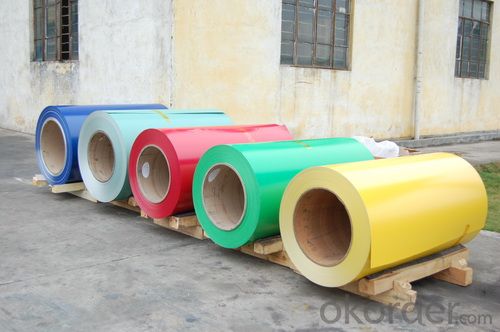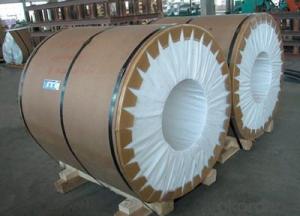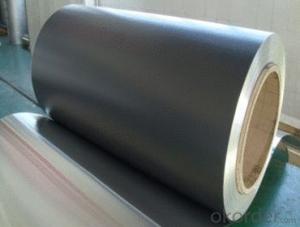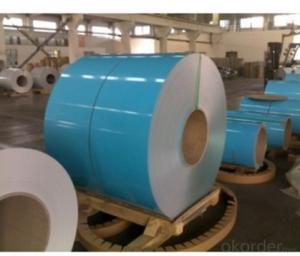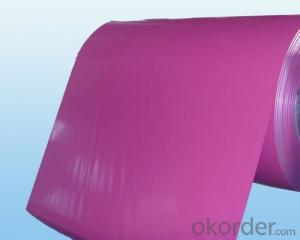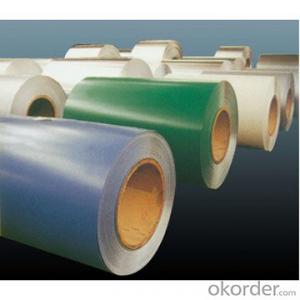Ams Aluminum Coil - Prepainted Aluminum Coil with Best Price and High Quality
- Loading Port:
- Shanghai
- Payment Terms:
- TT OR LC
- Min Order Qty:
- 5 m.t.
- Supply Capability:
- 2000 m.t./month
OKorder Service Pledge
OKorder Financial Service
You Might Also Like
Specification
Structure of Aluminium Coil Prepainted with Best Price and High Quality Description:
Coated aluminum coil/sheet are of a wide range of colors, which gives wonderful appearance no matter in residential and commercial constructions of great exhibition centers.
The coated aluminum coil/sheet have been widely used in the fields of construction and decoration( garage doors, ceiling etc.), electronic appliances, lighting decoration, air-condition air pipes, sandwich panels and drainages etc.
Main Features of the Aluminium Coil Prepainted with Best Price and High Quality:
1) High flexibility
2) Impact resistance
3) Excellent weather-proof durability
4) Anti-ultraviolet
5) High erosion resist
Images of the Aluminium Coil Prepainted with Best Price and High Quality:
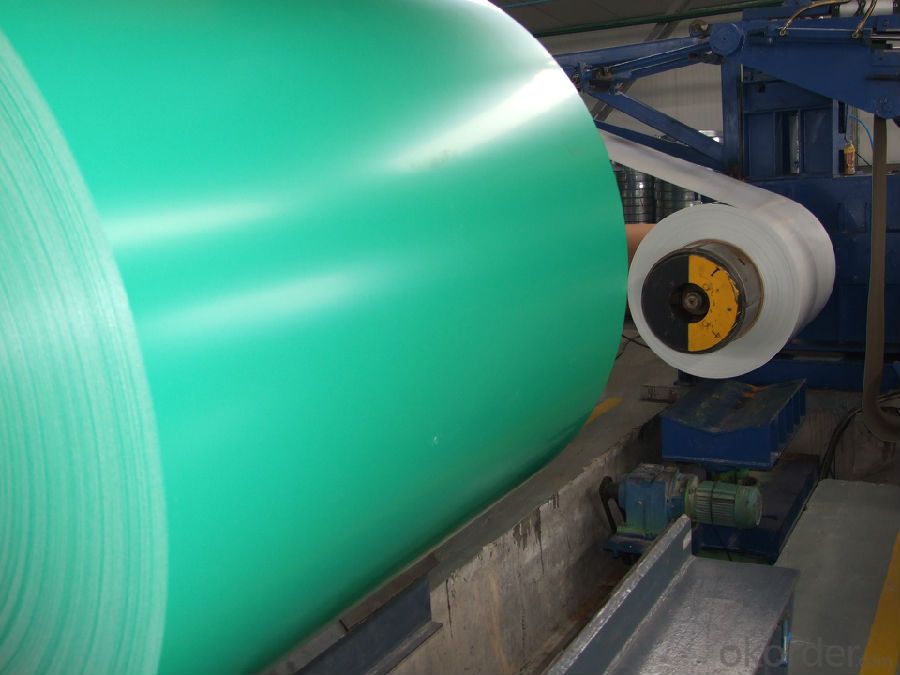
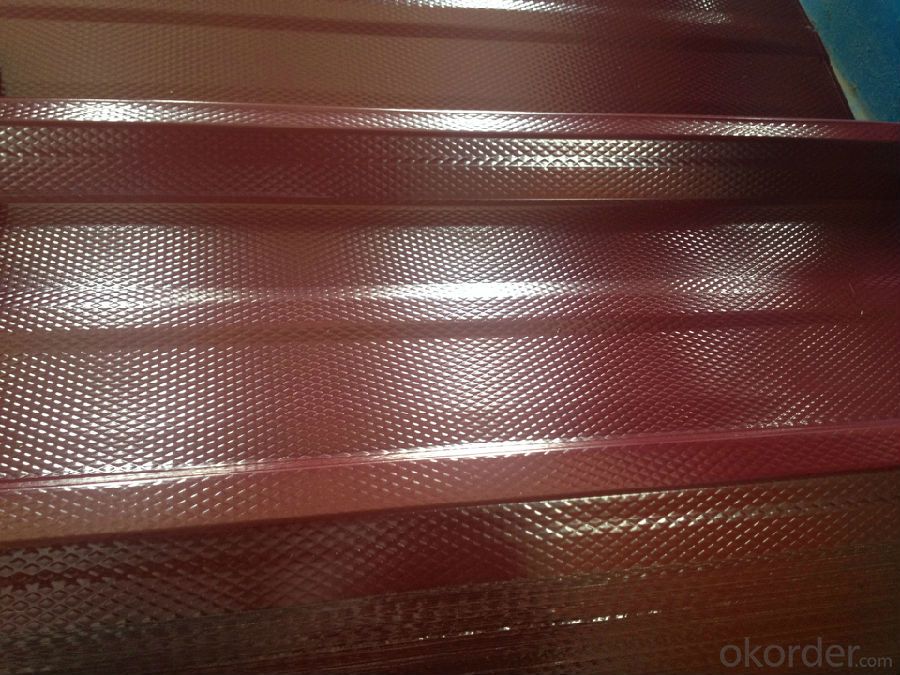
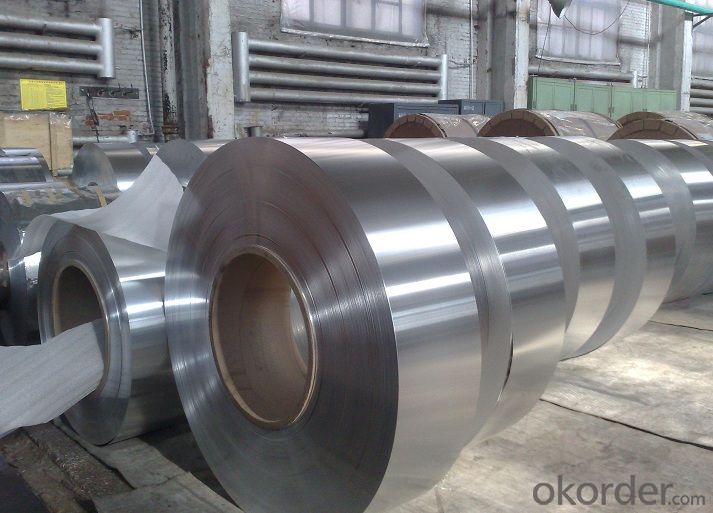
Aluminium Coil Prepainted with Best Price and High QualitySpecification:
Alloy | A1100,A3003,A1050,A8011 etc |
Temper | H16,H18,H24 |
Thickness | From 0.024mm to 1.2mm |
Width | Standard width:1240mm |
Special width:1300mm,1520mm,1570mm,1595mm | |
Diameter | Standard dia:1200mm |
Interior dia:150mm,405mm,505mm | |
Weight | 2.5 T/coil,3.0 T/coil |
Coating | PE, PVDF, AC |
Surface | Embossed, mill finish, coated |
Color | AS to code RAL |
Gloss | 10-90%(EN ISO-2813:1994) |
Coating Thickness | PE: more than 18 micron |
PVDF: more than 25 micron | |
Coating Hardness (pencil resistance) | More than 2h |
Coating adhesion | 5J(EN ISO-2409:1994) |
Impact Resistance | No peeling or cracking(50 kg/cm,ASTMD-2794:1993) |
Flexibility (T-bend) | 2T |
MEK resistance | More than 100 |
FAQ:
a.What is monthly capacity
---CNBM is one stated own company and our monthly capacity is about 2000tons.
b. Now which countries do you export your goods?
---Now we export to South East Asia,Africa, North America,South America ect.
- Q: Are there any environmental benefits to using aluminum coils?
- Yes, there are several environmental benefits to using aluminum coils. Firstly, aluminum is a highly sustainable material as it is 100% recyclable without losing its original properties. This means that using aluminum coils helps reduce the demand for mining and extracting new raw materials, reducing the environmental impact associated with these processes. Additionally, recycling aluminum requires only about 5% of the energy needed to produce primary aluminum, resulting in significant energy savings and reduced greenhouse gas emissions. Moreover, aluminum coils have a longer lifespan compared to other materials commonly used in coils, such as copper or steel. This durability means that fewer coils need to be manufactured and replaced over time, resulting in less waste generation and lower overall environmental impact. Furthermore, aluminum is corrosion-resistant, which eliminates the need for additional treatments or coatings that may contain harmful chemicals. This reduces the release of potentially hazardous substances into the environment during the manufacturing and use of aluminum coils. Lastly, aluminum is lightweight, which contributes to lower transportation costs and energy consumption during distribution. This aspect decreases fuel consumption and associated emissions, reducing the overall carbon footprint of using aluminum coils. Considering these factors, the use of aluminum coils provides significant environmental benefits, including reduced resource extraction, energy conservation, waste reduction, and lower emissions.
- Q: Explain the key differences between aluminum coil welding and soldering processes.
- <p>Aluminum coil welding and soldering are two distinct methods used in metal joining. Welding involves the fusion of aluminum coils using heat to create a strong bond between the metals. This process can be done with various techniques such as MIG, TIG, or laser welding, and it results in a permanent joint. Soldering, on the other hand, is a process that uses a filler metal with a lower melting point than the base metal (aluminum in this case) to join the materials. The joint is not as strong as a welded joint, and the process does not involve melting the base metal. Soldering is often used for electrical connections or when a less permanent bond is required. In summary, welding creates a stronger, more permanent bond by melting the base metal, while soldering uses a filler metal to create a less permanent bond.</p>
- Q: This question asks for a comparison of various types of equipment used for welding aluminum coils, highlighting their distinct features and applications.
- <p>Aluminum coil welding equipment varies based on technology, power source, and application. TIG (Tungsten Inert Gas) welders are known for high-quality welds and are ideal for thin aluminum coils. MIG (Metal Inert Gas) welders are versatile and suitable for thicker coils, offering faster welding speeds. Stick welders are more portable and cost-effective but produce lower quality welds. Laser welders provide precise, deep penetration welds suitable for high-precision applications. Friction stir welding is a solid-state process that offers excellent joint properties without melting the metal. Each type has its advantages and is chosen based on the specific requirements of the welding task, such as material thickness, weld quality, and production rate.</p>
- Q: Can aluminum coils be used for food processing equipment?
- Yes, aluminum coils can be used for food processing equipment. Aluminum is a popular material choice for its excellent heat transfer properties, corrosion resistance, and lightweight nature. It is commonly used in the construction of food processing equipment such as heat exchangers, evaporators, and condensers.
- Q: How do aluminum coils compare to steel coils?
- Aluminum coils are generally lighter, more corrosion-resistant, and have better thermal conductivity than steel coils. However, steel coils tend to be stronger and more durable. The choice between aluminum and steel coils ultimately depends on the specific application and desired properties.
- Q: Can aluminum coils be formed into different shapes?
- Yes, aluminum coils can be formed into different shapes through various processes such as bending, rolling, or stamping.
- Q: What are the factors that affect the price of aluminum coils?
- The price of aluminum coils can be affected by various factors. One of the main factors is the global supply and demand for aluminum. In the case of an aluminum shortage, the price of aluminum coils is likely to rise. Conversely, if there is an excess supply of aluminum, the price may decrease. Another factor that can impact the price of aluminum coils is the cost of raw materials. Aluminum is obtained from bauxite, and the cost of mining and extracting bauxite can fluctuate depending on factors such as labor expenses, energy prices, and government regulations. Any changes in these factors can affect the overall production cost of aluminum, which in turn can influence the price of aluminum coils. Transportation expenses also play a role in determining the price of aluminum coils. Aluminum is often transported over long distances, and the cost of shipping or trucking can vary based on fuel prices, distance, and other logistical factors. Higher transportation costs can contribute to the overall price of aluminum coils. Currency exchange rates can also have an impact on the price of aluminum coils. Aluminum is traded on global markets, and fluctuations in exchange rates can affect the cost of importing or exporting aluminum. If the currency in which aluminum is traded strengthens against other currencies, the price of aluminum coils may increase. Lastly, market competition can influence the price of aluminum coils. When there are multiple suppliers of aluminum coils, they may compete with each other to attract customers. This competition can result in price fluctuations as suppliers try to offer competitive prices to secure buyers. To sum up, the price of aluminum coils can be influenced by factors such as global supply and demand, the cost of raw materials, transportation costs, currency exchange rates, and market competition. Understanding these factors can help businesses and consumers anticipate and respond to changes in the price of aluminum coils.
- Q: Is it possible to customize the dimensions of aluminum coils?
- Yes, it is possible to customize the dimensions of aluminum coils. Aluminum coils can be fabricated and cut to specific dimensions according to the requirements and specifications of the customer. The customization process involves precise cutting and shaping of the aluminum coil to achieve the desired dimensions. This allows for flexibility in various industries and applications where specific coil sizes are necessary. Customizing the dimensions of aluminum coils ensures that they can fit seamlessly into different production processes, machinery, or end-use applications.
- Q: How are aluminum coils coated or treated for specific applications?
- Aluminum coils are coated or treated for specific applications through various processes such as painting, anodizing, and thermal spraying. These treatments enhance the coil's durability, corrosion resistance, and aesthetic appeal. For example, painting involves applying a protective coating of paint to the aluminum surface, while anodizing involves creating a layer of oxide on the surface to improve resistance to wear and corrosion. Thermal spraying is another method where a coating material is sprayed onto the surface using heat, providing additional protection and specific functional properties.
- Q: Are aluminum coils resistant to vibration?
- Yes, aluminum coils are generally resistant to vibration. Due to their inherent strength and elasticity, aluminum coils can withstand vibrations and oscillations without significant deformation or damage. This property makes them suitable for various applications that involve mechanical movement or exposure to vibrations.
Send your message to us
Ams Aluminum Coil - Prepainted Aluminum Coil with Best Price and High Quality
- Loading Port:
- Shanghai
- Payment Terms:
- TT OR LC
- Min Order Qty:
- 5 m.t.
- Supply Capability:
- 2000 m.t./month
OKorder Service Pledge
OKorder Financial Service
Similar products
Hot products
Hot Searches
Related keywords
